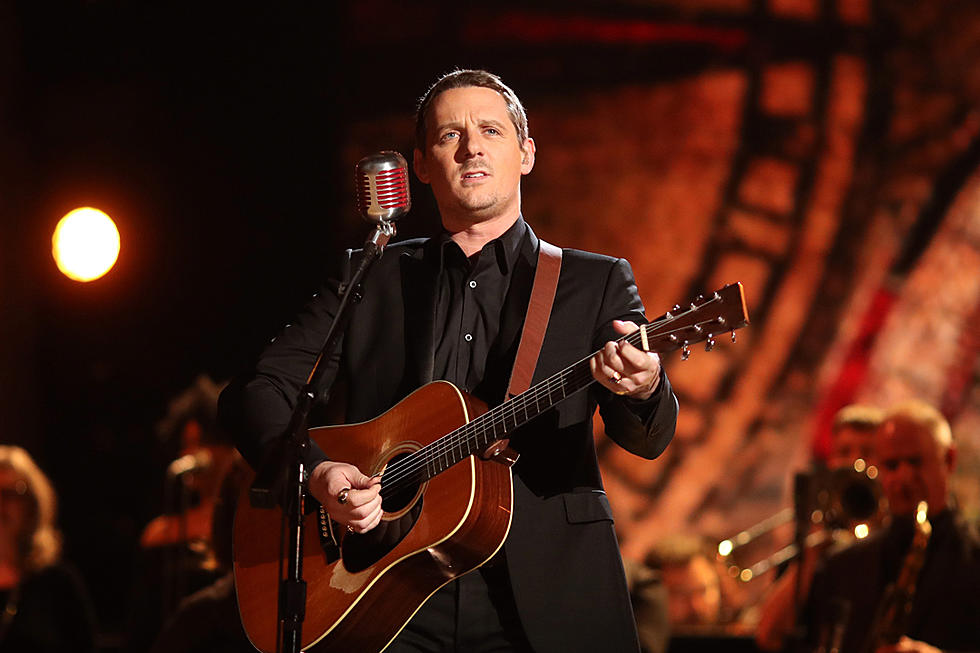
Sturgill Simpson Says He’s ‘Done’ With His Record Label, Rails Against the Music Industry in New Interview
Sturgill Simpson said he’s “done” with his record label. In a fiery new interview with Uproxx, the singer-songwriter rails against those in charge at Elektra Records and the music industry as a whole.
"I’m done. I’m done," Simpson says of his label. "Unless they drop me, I’m done."
In the interview, Simpson questions the value of record labels to artists’ ability to create and release their art, calls out the alleged “secret committees” behind the Grammy Awards and says he’s never working with a producer again. He says he’s tired of subjecting himself to the machine of the music business, but Elektra, which is owned by Warner Music Group, is the main target of his ire.
“I was manipulated into thinking I needed a record contract when I knew I never did, by certain individuals who aren’t even in my life anymore, because they had their own back-channel deals working behind the scenes that nobody tells you about until the ink’s dry," Simpson says. His comments reveal an artist fed up with feeling like he'd become a commodity.
“A bigger recording budget is the only reason any real artist should sign with a record label,” Simpson says. And while he says he still loves being in the studio, Simpson admits he’s no longer interested in "giving babies away" to a label, to the point where he doesn’t want to talk too much about the new music he’s written because he doesn’t want to get a call from Elektra.
Simpson's nomination for Album of the Year at the 2017 Grammy Awards, for A Sailor’s Guide to Earth, appears to be the event that finally solidified his view of the music business. In his view, that nod was Elektra trying to get a “return on investment,” and that if he had released the album on a smaller label, it never would have been nominated.
“I know that for a f--king fact,” he says, “because I know those secret committees exist, and that’s all them trying to service themselves. It really had nothing to do with me.”
Simpson’s most recent album, Sound & Fury, came out in September, and he kicks off a nearly sold-out arena tour in support of the record on Friday (Feb. 21). He tells Uproxx this tour is a “celebration of the music and the fans and everything that’s happened, especially the band,” but he’s not sure he’ll ever tour again after this run. He attributes the ticket sales on the tour to the fans rather than any promotion from Elektra.
Sound & Fury was released along with a Netflix anime film that Simpson asked Elektra to pay $1.2 million for before he would release the album. The hefty price tag and his reluctance to promote the album (“It’s very important not to be a thirsty b---h,” he says) seem to be part of Simpson's larger strategy to further distance himself from the label. Simpson isn’t quitting music, but he seems to be heading toward a more DIY approach.
“I don’t really ever want to work with a producer again, having done it and knowing what a struggle it can be,” he says. “Because they all have their agenda, which is trying to make money or sell this commercialized version of what they think you are.”
Simpson made two albums with producer Dave Cobb, High Top Mountain and Metamodern Sounds in Country Music; he produced A Sailor's Guide to Earth himself and co-produced Sound & Fury with John Hill and his bandmates. Simpson says that on Metamodern Sounds, he had written and “carved out” songs when he was on the road with his band, but Cobb -- who has produced albums for Chris Stapleton, Brandi Carlile, Jason Isbell and more -- got most of the recognition for the record anyway.
“He got all the credit and career from it, but that’s my album," Simpson says. "Anybody that’s heard my last few records, I think it’s pretty fucking clear."
As many bones as Simpson picks with the music business in the Uproxx interview, he seems hopeful that there is a path forward for artists who don’t want to participate in the “horses--t,” as he calls it. He’s writing a book that will be full of “the kind of stuff that fans probably deserve to know, but you don’t really want to say while you’re still actively engaged in the business.” Simpson says he won’t publish the book until he retires, however.
“I’m not done learning,” he says. “I don’t think my journey’s over yet.
50 Country Albums Everyone Should Hear Before They Die
More From TheBoot


![Brit Taylor Offers a Dizzying Look Behind the Scenes of Her Somber Love Song ‘Kentucky Blue’ [VIDEO PREMIERE]](http://townsquare.media/site/623/files/2022/11/attachment-brit-taylor-kentucky-blue-music-video.jpeg?w=980&q=75)
![Sturgill Simpson Joins Angel Olsen for New ‘Big Time’ Duet [LISTEN]](http://townsquare.media/site/623/files/2022/09/attachment-sturgill-simpson-angel-olsen-big-time.jpg?w=980&q=75)





